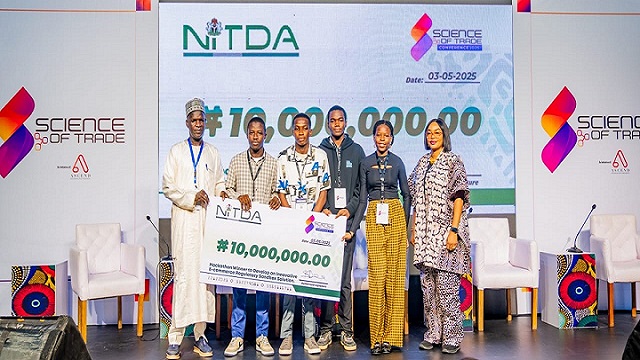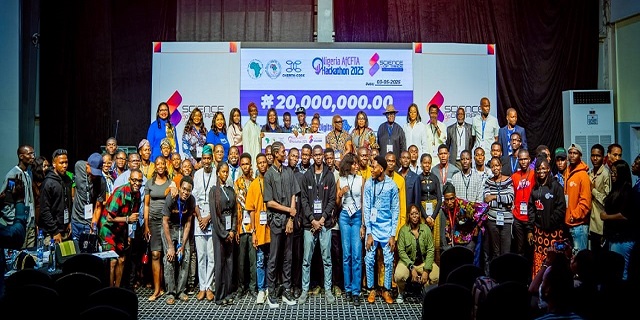News Highlights:
- Emerging technologies are critical to unlocking Africa’s trade and investment potential under AfCFTA.
- AfCFTA Digital Trade Protocol and innovations are set to drive inclusive, cross-border trade across the continent.
The Director General of the National Information Technology Development Agency (NITDA), Kashifu Inuwa, has reaffirmed the transformative power of emerging technologies in reshaping trade and investment across Africa, reports Digital TimesNG.
Delivering a keynote address at the Nigeria AfCFTA Hackathon 2025, held as part of the Science of Trade Conference in Lagos, Inuwa stressed that digital innovation holds the key to unlocking efficiency, inclusivity, and sustainable economic growth across the continent.
Represented by Engr. Salisu Kaka, Director of the Digital Economy Development Department, the NITDA boss highlighted the significance of the African Continental Free Trade Area (AfCFTA), describing it as “one of the world’s largest free trade zones,” bringing together over 1.4 billion people with a combined GDP of more than $3 trillion.
Inuwa noted that the recent adoption of the AfCFTA Digital Trade Protocol marks a crucial turning point. “It will break down trade barriers, streamline regulations, and open new markets for businesses of all sizes,” he said.
He emphasized Nigeria’s strategic position in this transformation, stating: “Nigeria, with a population of over 200 million and strong entrepreneurial culture, is uniquely positioned to lead Africa’s digital transformation.”

Highlighting the rise of e-commerce and mobile payments as pivotal developments, Inuwa remarked: “From Abuja, I can order products online, conduct due diligence, make payments, and receive deliveries; technology has made trade seamless.”
According to him, the Hackathon comes at a critical time, following the African Union’s 2024 endorsement of the Digital Trade Protocol. “It aims to harmonise digital regulations and eliminate trade barriers across all 54 African nations,” he added.
However, Inuwa acknowledged that despite global progress, many African trade systems remain encumbered by outdated processes, excessive paperwork, and logistical inefficiencies. “But a shift is underway, powered by innovations such as blockchain, AI, IoT, and digital platforms, which are now central to trade operations,” he stated.
He cited the success of the Nigeria Customs Service (NCS) in leveraging digital tools through the Nigeria Integrated Customs Information System (NICIS II). The system, he noted, automated key processes such as declarations, cargo tracking, and risk assessment—resulting in a 238% increase in revenue between 2017 and 2023.
The newly launched Unified Customs Management System, which replaced NICIS II in December 2024, has already generated over ₦31 billion, showcasing the country’s advancement in digital trade facilitation.
The Hackathon, Inuwa explained, is strategically focused on five priority areas: Youth and MSME Inclusion, E-Commerce Adoption, E-Commerce Policy and Trust, Digital Payments, and the E-Commerce Regulatory Sandbox. These, he said, are areas where digital tools can significantly enhance trade dynamics across the continent.
“I’m confident that the Hackathon will spark innovative, scalable solutions to boost intra-African e-commerce, streamline cross-border transactions, and empower MSMEs with digital capabilities to compete globally,” he concluded.
Inuwa described the Hackathon as a springboard for ground-breaking solutions that will simplify payments, promote inclusion, and strengthen Nigeria’s leadership in advancing the AfCFTA digital economy framework.
In his welcome remarks, Dr. Olusegun Awolowo, National Coordinator of the Nigeria AfCFTA Coordination Office—represented by Olusegun Olutayo, Senior International Trade Policy and Law Expert—underscored that transformation is an ongoing journey.
He noted that collaboration, innovation, and inclusive growth are essential to positioning Africa as a global hub for digital trade. Reaffirming AfCFTA’s promise, Awolowo said the agreement presents Africa as a unified market of over one billion people, offering immense opportunities for intra-African trade, investment, and economic development.
He emphasized that realising this vision requires active participation and shared ownership, stating: “The Hackathon is a tangible mechanism for implementing the AfCFTA Digital Trade Protocol—prioritising inclusion, innovation, and equitable access.”
He added that it is expected to yield actionable solutions that bridge the gap between policy and practice, accelerating Africa’s digital economy and empowering the next generation of African innovators.

